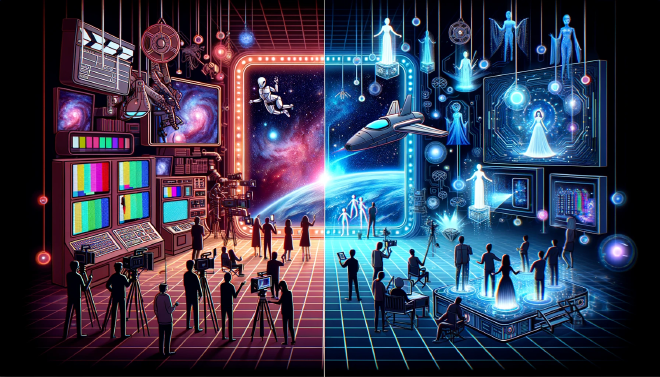AI and Filmmaking

I’ve been thinking a lot about how AI changes the way we create. That might not be a surprise: I’m an AI researcher, and I’ve spent two decades making theatre. AI and creativity are both on my mind often.
The ongoing conversation about AI in cinema—including the recent Writer Guild of America Strike and the resulting 2023 WGA agreement—and in creativity more generally, offers us a window into how the way we create is changing. And the power that creators have to shape that change.
I don’t make movies. But, my experience writing, collaborating, producing and performing drives my curiosity about the way these processes are changing in filmmaking with innovations in AI.
Generative AI is changing how movies are made. It has the potential to augment the creative processes and workflows of filmmakers.
Take, for example, Dramatron-—an AI-powered software designed to augment the creative process for screenwriters.
With AI’s ability to analyze vast amounts of data and patterns, tools like Dramatron bring a fresh perspective to storytelling in cinema by taking an initial idea and turning it into a script with characters, plot, settings, and dialogue through co-authorship. Dramatron allows an author to modify and adapt that script in different ways, it is a process innovation. The AI acts like a collaborator, augmenting the process through which writers can bring creative ideas to life.
But movies are much more than just words on a page. And writers—even great ones—may not always be able to communicate every aspect of a film through a script. Multimodal models are helping creators envision scenes, character appearances and voices, and soundscapes (e.g. this trailer for the Beaconsfiled Assignment). Whether it’s the gentle whooshing of wind in a willow tree or the thunderous roar of a waterfall, generative AI models are opening up a world of possibilities for filmmakers to craft scenes that align with their creative vision.
AI has the amazing power to unlock creative potential within us. It is helping filmmakers to bring their visions to life. And it can help many more newcomers to the industry to discover their abilities.
Of course, there are potential downsides. If studios rely on AI-generated ideas, it may mean fewer opportunities for creative individuals to contribute and be compensated for their work. To this end, the recent WGA agreement explicitly establishes regulations for the use of AI. Important questions also arise about data ownership and intellectual property which must be carefully considered and addressed. And, the data that AI models are trained on can perpetuate inherent biases and reinforce stereotypes.
AI has real potential to uplift and enhance our creativity. And it’s the decisions that creators make right now—the way that we choose to, or choose not to, use these tools, and the intentions that we have when we create with them—that will decide if how we realize that potential.
That’s why collaboration is fundamental to ensure a balanced approach that values human creativity and diverse perspectives. We need to test, try, revise, and remix the technology and we ought to do so in collaboration with experts and professionals in creative industries.